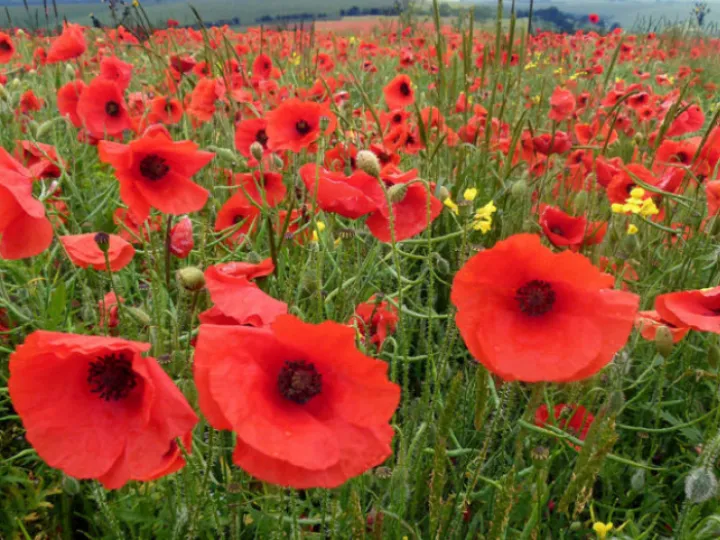Remembrance Day 2020
Remembrance Day 2020
We have become used to looking at graphs and discussing statistics, with over 1 million people affected, and a death toll approaching 48 thousand. We have also become used to wondering where the truth lies, because some say there are more than 60 thousand fatalities; it's how you make the count. We have become used to looking at maps of the world and seeing how the situation is changing globally, sometimes on a daily basis.
The nation has been asked to sacrifice personal liberties for the duration, in an attempt to ensure that the "front line" is not overwhelmed and that it can be supplied for the task it has to perform. We have become used to the language of "key workers"; those who feed us, those who care for us; and the implications for those who are not key workers and their role within the economy. This has led to economic hardship and people being laid off or made redundant. Some have found new opportunities to support the effort, as delivery drivers, volunteers or filling the place of agricultural workers who would normally have come from abroad.
The government has mobilised the nation's industrial output. Machinery plants within the automotive industry, whose sales had plummeted, were re-tooled to produce personal protective equipment. They were joined by others, both large and small, private companies and individuals, who utilised their 3D printers to produce vital equipment to support the front line. The Bank of England increased the issue of bonds and imposed strict financial controls.
The government has published its first assessment of the impact, how panic buying emptied the shelves of essential resources. In response a national task force was convened to ensure continuity within the supply chain. Rationing was imposed on restricted goods and re-assurances were provided that the nation would be fed. It has been recommended that the Government appoints a Minister for Food Security to establish a greater level of control over the nation's supply chain, which had been severely disrupted by barriers to international trade and the ability to source from overseas. But, even so, the number of people experiencing food insecurity, defined as the lack of physical and economic access to sufficient, safe and nutritious food, reached record levels affecting 4.9 million adults and 1.7m children.
In an extraordinary broadcast from Buckingham Palace, Her Majesty the Queen sought to reassure the nation. She acknowledged those who are (to quote) "feeling a painful sense of separation from their loved ones." She continued, "we should take comfort that, while we may have more still to endure, better days will return: we will be with our friends again: we will be with our families again: we will meet again."
The nation responded and daily stories emerged of our community spirit. Some were recognised, many were unsung. One food chain in London delivered more than 315,000 meals to frontline workers. One restaurant provided luxury meals to say thank you to hospital staff. A 99-year old veteran called Tom Moore raised millions of pounds by walking up and down his garden. Perhaps less well known was a Muslim from St Albans celled Dabirul Islam Choudhury, aged 100, who raised more than £170,000 for charity by walking around his garden, and doing so whilst observing the restrictions of the Feast of Ramadan. Paul Harvey, a former music teacher with dementia, who as a party game used to compose a tune from four musical notes that people volunteered, captured the imagination of the BBC Philarmonic who combined to produce an award winning disc. There was a nurse who founded a national movement to make scrubs for the frontline and the list goes on. And we all stood united on a Thursday evening, to echo our appreciation as we clapped and gave expression to our solidarity.
I am, of course, writing about the Covid pandemic. But the language and actions are evocative of wartime: we have a "frontline" and "key workers", there is a national task force, a curtailment of personal liberties, disruption of trade, the economy is impacted, there are people rising to the need, and a future that remains subject to uncertainty. Perhaps for the first time, for many of us, we get a glimpse of what living during the war must have been like. We are tired, we want Covid to go away and life to return to normal, but although we are in the 10th month of Covid we remind ourselves that the war lasted for 6 years. As we mourn almost 48 thousand deaths, each someone of value and someone loved, we remember that three quarters of a million UK citizens died in world war one, and 451,000 in world war two. Perhaps for the first time, for many of us, we get a glimpse of the sacrifices that were made by the nation so that we might enjoy the freedoms we experience each day.
"Jesus said, this is my commandment, that you love one another as I have loved you. Greater love has no man that this, that a man lay down his life for his friends." As we reflect on the present, we remember the past, and we do so with gratitude for the many who lay down their lives then and who continue to do so today.

